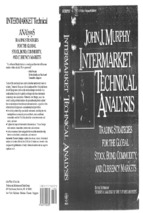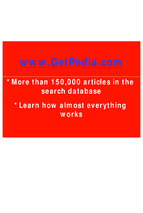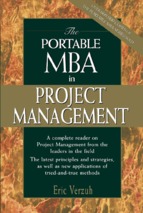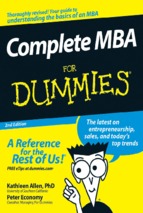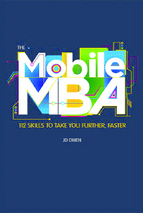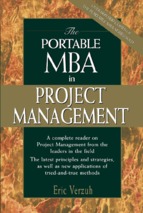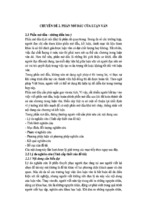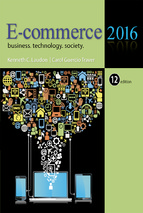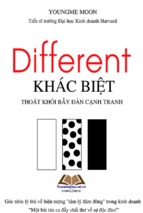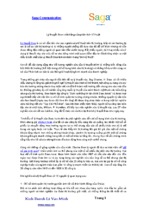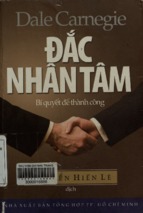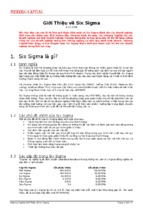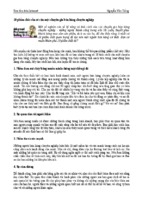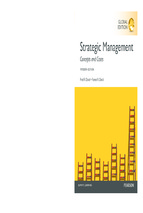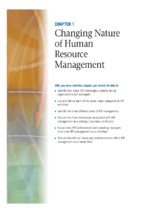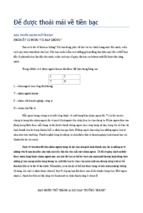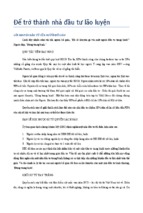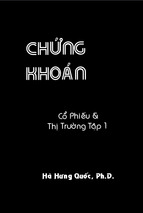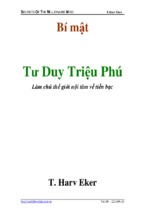More Praise for More Than Money
“More than a master of business administration, Mark Albion offers his readers an advanced degree in the meaning of life. His MBA is a Master of Blessed
Att itude, and it suggests a course of personal development that will give everyone more than money—it will give them purpose, direction, and hope.”
—Alan M. Webber, former editorial director and
managing editor, Harvard Business Review
“Dr. Albion has developed the tools for helping us fi nd our way in our professional lives. While this book is written for MBAs, it will speak to anyone who
has struggled to fi nd more meaning in his or her career. A compelling writer,
Dr. Albion is open about himself, admits his mistakes, and through his own
telling of how he learned from them, teaches us how to recognize ours and
change the course of our lives for the better.”
—Phoebe Higgins, Dominican University of
California, MBA, 2007
“The basic messages of the book summon up, and resonate with, my own
experiences as an MBA student, and I realize that I would have been one of
the people this book was intended for. I’m reminded of some of the lessons
I’ve learned the hard way since leaving my MBA program. Not only does More
Than Money invite us to question how success is really best measured, but it
also offers some practical tools for fi nding a more holistic return on an MBA
investment.”
—David Wood, Fisher Graduate School,
Monterey Institute, MBA, 1993
“Before gett ing an MBA, read More Than Money. Th is book revolutionizes
business school education and will help any MBA student get more out of
school. In his special way, Dr. Mark leads you to defi ne fi rst what you want to
do with your life. He does so by guiding you not with answers but with crucial
questions that help you connect with who you are and what you wanted as a
child but deemed impossible. Now it is possible.”
—Anton Arapetyan, Lviv (Ukraine) University
MBA, 2006, Lviv Business School
“More Than Money reaffi rms that as human beings we fi rst need to love and be
loved—before we are MBAs. Our MBA degrees, our positions, money, and
assets are tools that can help us to love. For when all is said and done, on our
deathbeds, love is the only thing that will have mattered. Thank you, Dr. Mark,
for being that voice that speaks to our spirits, not just our heads.”
—Tolulope Ilesanmi, McGill University,
MBA, 2005
“This book has me thinking in a very serious way about my life, my place in the
world, and how my strengths and talents can be of service. It has me remembering the best times at work and how good it felt to be working together toward
common objectives with a common purpose and with passion. I’d like to find
that again. More Than Money is really going to help me focus on doing so.”
—Douglas Hammer, New York University, Stern
School of Business, MBA, 1999
“We have all heard stories of business school graduates who took decades
to realize the careers they chose right out of school were the wrong ones for
them. Benefit from the teachings in this book and start building yourself a
sustainable career now, so you don’t have to undo your mistakes later.”
—Erika Haas, Stanford Graduate School of
Business, MBA, 1998
MORE THAN
MONEY
This page intentionally left blank
MORE THAN
MONEY
Questions Every MBA
Needs to Answer
Redefining Risk and Reward for a Life of Purpose
Mark Albion
More Than Money
Copyright © 2008 by Mark Albion
All rights reserved. No part of this publication may be reproduced, distributed, or transmitted in any form or by any means, including photocopying,
recording, or other electronic or mechanical methods, without the prior written permission of the publisher, except in the case of brief quotations
embodied in critical reviews and certain other noncommercial uses permitted
by copyright law. For permission requests, write to the publisher, addressed
“Attention: Permissions Coordinator,” at the address below.
Berrett-Koehler Publishers, Inc.
235 Montgomery Street, Suite 650
San Francisco, California 94104-2916
Tel: (415) 288-0260, Fax: (415) 362-2512
www.bkconnection.com
Ordering information for print editions
Quantity sales. Special discounts are available on quantity purchases by corporations, associations, and others. For details, contact the “Special Sales
Department” at the Berrett-Koehler address above.
Individual sales. Berrett-Koehler publications are available through most
bookstores. They can also be ordered directly from Berrett-Koehler: Tel:
(800) 929-2929; Fax: (802) 864-7626; www.bkconnection.com
Orders for college textbook/course adoption use. Please contact BerrettKoehler: Tel: (800) 929-2929; Fax: (802) 864-7626.
Orders by U.S. trade bookstores and wholesalers. Please contact Ingram
Publisher Services, Tel: (800) 509-4887; Fax: (800) 838-1149; E-mail:
[email protected]; or visit www.ingram
publisherservices.com/Ordering for details about electronic ordering.
Berrett-Koehler and the BK logo are registered trademarks of Berrett-Koehler
Publishers, Inc.
First Edition
Hardcover print edition ISBN 978-1-57675-656-0
PDF e-book ISBN 978-1-57675-983-7
2008-1
Project management, design, and composition by Dovetail Publishing
Services. Cover design by MvB Design.
To Joy,
for thirty years
This page intentionally left blank
■ ■ ■ ■ ■
Contents
Foreword, Liz Cutler Maw
Preface
ix
xiii
Introduction: The MBA Trap
1
Chapter 1: Who Are You?
15
Chapter 2: What Do You Want?
33
Chapter 3: What Can You Do?
51
Chapter 4: Where Are You Going?
69
Conclusion: From Success to Significance
83
Resource: The Challenge of Money,
Elliot Hoff man
89
Acknowledgments
97
Index
99
About the Author
105
vii
This page intentionally left blank
■ ■ ■ ■ ■
Foreword
Liz Cutler Maw, Executive Director, Net Impact
“Incredible.” “Dynamic.” “Inspiring.” “Awesome.”
As MBAs, you encounter many kinds of teachers. There are tenured professors
who recite lectures from memory. There are guest lecturers who bring real-live
case studies into the classroom. There are patient tutors who symbolically hold
your hand through the crunch of the core curriculum.
And then there is Mark Albion.
Mark is a different kind of teacher, one who ventures outside the classroom walls to teach what he loves to people he loves. Mark is passionate about
fi nding meaning in life and work, and he has made it his life’s mission to share
that passion with others.
At the Net Impact annual conference, we are fortunate to see countless
great speakers, but few have made the impact on students that Mark Albion
has. The adjectives at the beginning of this section are just a few of the accolades heard yearly as we poll attendees on their favorite speakers. Mark’s name
is always at the top of that list.
Why is Mark such a hit with MBAs and other business students or
professionals?
I have my theories:
▶
Mark embodies the advice he gives. In More Than Money, Mark
advises readers to think differently about career possibilities.
Mark’s personal story is one in which he thought differently, chose
differently, and acted differently—and he glows with personal
peace from doing so.
ix
▶
Mark understands that his topic is a hard one. It’s not easy to make
career choices during business school, with the many options,
sources of advice, and fi nancial constraints you face. Choosing the
right job or internship can seem like the most important decision in
the world to stressed and overwhelmed MBA students. Mark knows
this, and he doesn’t belitt le the seriousness of the choice but rather
supports his audience to make the decision the right way.
▶
Like any good student, Mark has done his homework. He has
collected hundreds of life stories and examples of career paths, and he
has traveled the globe to learn and share these experiences with others.
▶
Mark is warm, funny, and caring. It’s much easier to believe everything will be OK with Mark as a guide instead of some of the other
types you might meet on your MBA journey. (You know the types
I mean.) And Mark’s right—it will be OK! Especially if you use
More Than Money as a resource.
At Net Impact, too often we hear from MBA students that they are torn
about how to make a difference and when to make a change in their career. The
decisions are tough ones, and the answers depend on each individual’s passions, talents, and life goals. Th is book is for everyone who is pondering these
issues now or who will face them in the future. Mark will lead you through his
unique process of asking the right questions and fi nding the right path.
There are many books designed to get you thinking about your career
and others that help you explore your feelings about your life, but very few
intermingle the two as successfully as Mark has. More Than Money will ask you
hard questions about who you are, what you want, and how you make decisions. If you challenge yourself, it may not be the easiest book you’ve ever read,
but it may save you years of heartache.
Mark organizes his book around four questions and twelve lifelines, the
result of which is what he terms a “destiny plan.” He offers you choices on how
deep you want to delve into the questions he poses and offers suggestions for
working with groups of friends or colleagues to explore ideas and potential
actions. He also offers tools and resources to equip you on your quest. And
x
More Than Money
he throws in many great stories to keep you inspired and to make you smile.
Whether you’re curious and just want to enjoy Mark’s readable prose or you’re
ready to get down to the details of planning your future, Mark’s book will
reward your efforts with new insights and possibilities.
Th is book is a gift from a dedicated friend of Net Impact and a devoted
mentor for MBA students and professionals around the world. As Mark says,
More Than Money “supports you to follow your dream and make a contribution.” I hope that this book leads you not just to more than money but to a
future that is more satisfying than you had ever dared to dream.
Liz Cutler Maw has been Net Impact’s Executive Director since the fall of
2004. Liz has been active with the Net Impact network since 1999; she was
a co-leader of the student Net Impact chapter at Columbia Business School
and a co-founder and leader of the Bay Area Professionals Chapter. Liz’s
professional experience includes strategic consulting to nonprofits with the
Bridgespan Group, a not-for-profit strategy consulting fi rm, as well as fundraising and direct marketing for nonprofit organizations in New York City
and Washington, D.C. She holds a BA with honors from Yale University and
an MBA from Columbia Business School. Liz also spent one semester at the
Haas School of Business at U.C. Berkeley.
FO R E WO R D
xi
This page intentionally left blank
■ ■ ■ ■ ■
Preface
I don’t know what your destiny will be, but one
thing I know: the only ones among you who will be
really happy are those who have sought and found
how to serve.
Albert Schweitzer, humanitarian
When was the last time you were called an “arrogant asshole” and it led to a
compliment?
I remember the last time it happened to me: December 16, 2002. Yes, someone really called me that to my face—in public, no less. And yes, she was right.
Th is public unmasking made me think more deeply about my life and
career path than I had in my fi rst fi ft y-one years. In reflection, I kept coming
back to the central question of this book, the question that will help you begin
your journey from business school to your unique destiny.
Over the past six years, this question has spawned other questions, many
of which were posed by MBAs attending my speeches. Your “assignment” is to
choose those questions that resonate most deeply with you and address them.
They will help you think differently about your career and your place in the
world. They will help you fi nd your path of service, your personal path of happiness and fulfi llment.
But fi rst, let me tell you what happened that unusual winter day.
After the corporate embarrassments of the unethical activities of Enron,
Tyco, WorldCom, and others, the Harvard Business School Alumni Association was not going to invite another CEO to speak at its 2002 year-end session.
Instead, the alums decided to get someone “safe.” They chose me.
xiii
I’d left Harvard in 1988 after nearly twenty years as a student and professor. I’d been back to school many times since then, speaking to various groups
of students, large and small, about a network of service-minded MBAs I had
cofounded, Net Impact, and its parent organization, Social Venture Network,
the preeminent network of socially conscious entrepreneurs.
It was always fun to come back to speak at my old haunt—and a bit
strange, too. Maybe I didn’t act the same or speak the same as I did at the other
business schools I’d visited. Whatever it was, something unusual always happened when I spoke at the institution that had been my “home” and my identity for the fi rst half of my adult life.
I gave my speech to a packed hall of HBS graduates. It seemed to go well,
I guess. I handed out my latest media effort, a three-CD series titled Finding
Work That Matt ers, and asked for questions. Many hands shot up, and I chose
one near me, in the fi rst row. The hand, the person, looked familiar. I wasn’t
sure. Soon I would be.
“Thank you for coming, Professor Albion,” she began. “My name is Sara
Smith [not her real name]. I was one of your students in fi rst-year marketing
back in 1982.”
Yes, I remembered her and drifted back twenty years in my mind. I tried hard
to picture the thirty-one-year-old Professor Albion. Then came the wake-up call.
“May I say that while I think we learned a lot about marketing in your
class that year, you were the most arrogant, self-centered asshole I had ever
encountered in my life.”
Thank you, Ms. Smith, I thought, for that announcement to yours truly
and the audience. That should get me a speedy request to come back to speak
to alums soon! Maybe I had given her a bad grade? Maybe not. But thankfully,
there was more to come.
“And as much as you came across as a Mr. Know-It-All, and as much as
your self-absorbed att itude and arrogance repelled me then, today I fi nd you
kind and gentle, a caring man, who has wisdom to share and has done so in an
engaging, collaborative manner. Today, you seem to have as many questions
as answers—a curiosity and wonder about life I fi nd quite infectious. And you
xiv
More Than Money
are so energetic and seem so happy! I don’t know what happened in the last
twenty years, Professor Albion, but you obviously learned a lot. Congratulations. Good for you!”
In the following weeks, I realized that Sara had described someone I no
longer knew (I hoped!) but someone she had described accurately. Back in my
Harvard days, despite my accomplishments, I felt insecure and ungrounded.
I was in need of reconnecting with who I was, who I wanted to become, and
what I was placed on earth to do. I was not yet on my destiny path.
Sara got me thinking about my destiny: If I died, how would I be remembered? What would my eulogy be? Would people remember me as the fi rst
person she described or as the second one? My reaction was simple: “I wish I
had thought about this earlier in my career!”
More Than Money asks one question in many ways, using questions and
stories to reframe your career decisions for life’s essential purpose: What will
your contribution be? The answer will tell you how you will be remembered,
how future generations will think of you when they look at your ancestral tree,
and when your eulogy is read, whether or not you’d be proud of what is said.
How paradoxical, you might say, that you start your career search by
contemplating your death! Yet that is the key to developing a destiny plan—
the key to living your life.
Beginning with the question of contribution rather than the more usual
“How can I make a living?” makes all the difference in the path you’ll choose
and where you’ll end up. It will give you a strong foundation for all that follows,
implicitly changing your business focus from getting to giving. Your reward is
that you’ve taken the fi rst step toward managing your career with your heart,
the pathway for great things to happen.
To answer this question of contribution, you’ll need to consider how
your work will fit into your life. Be aware that in death, rarely will loved ones
remember you for your work in private enterprise as much as for what you’ve
done for your family and contributed to civil society.
There is one caveat that is crucial to your ability to make that contribution when making your career choices: What you perceive to be your “safest”
P R E FA C E
xv
choices may be your riskiest, and vice versa. Reframing this mental and emotional
shift, convincing you to make it, and supporting and guiding you to act on it in
your own way—that is the work of this book.
More Than Money is meant to complement a business school education.
Whereas a rapidly growing number of schools now have courses in sustainable
development, microfi nance, corporate social responsibility, and social enterprise, few have material to help you develop a sustainable career. The book is
written so that whether you are considering business school, entering business
school, a current student, or a graduate, it should speak directly to you. I know.
I’ve sat in your seat.
Who Is Mark Albion?
I am a “confl icted achiever.” Maybe you are, too.
Like many of you, I worked hard to get the best education I could fi nd
and then took the highest-paying, most prestigious job I could get to build a
career platform from which I hoped to leap into work that I’d really love. What
I found out is that it wasn’t that simple and that there was a price to pay for taking that path. And I probably wouldn’t have had to pay that price, even taking a
similar path, if I had been more aware of who I was and what I really wanted.
The fi rst half of my life was Harvard. I began Harvard College when I was
fourteen years old. Not actually, of course, but it was true in my mind. I’d meet
girls and tell them I went to Harvard to impress them. I thought they believed
me. Maybe not. Maybe they did by the time I was sixteen. I don’t know. I just
know I didn’t care back then. I knew that when the time came, I was going to
Harvard, and that was that. There was never a question in my mind.
I’ll bet you too have a “Harvard” in your life. “Harvard” represents reaching your dream, showing everyone how good you are, how accomplished
you are, how special you are. It’s society’s confi rmation that your life on earth
counts—counts more than the lives of most other people.
I needed that confi rmation, that identity. My parents divorced before I
could remember, and I had barely seen my father. Maybe I thought that I was
the reason for their breakup or the reason Dad rarely saw me. I don’t know. But
xvi
More Than Money
I knew one thing: my mother loved me, and if I went to Harvard, my father
would surely love me, too.
That’s all I really wanted: to be loved. And respected, I might add. Everything else was simply a facsimile of this truth. Maybe that’s your truth.
My father had gone to Harvard (he was even buried in 2007 wearing his
Harvard Class of ’45 tie). So in 1969, where else could I have gone to college?
Dad picked my major (economics) and one of his real estate properties served
as the basis for my undergraduate thesis. I felt that those choices would bring
me closer to Dad, but my heart wasn’t in it.
As graduation loomed, it was a slow period for selling real estate, so
instead of going to school or working, I backpacked around the world for a
year. It was a “socially unacceptable” choice, but it would be the most important experience of my young life.
I learned that I could take care of myself and that there were many ways
to live a life. I learned about compassion, something lacking in my previous
education. I worked with children in impoverished areas of India and the
South Pacific. I supported myself by arranging an import-export business with
Dad. It paid for the trip and made Dad good money, too.
Back home in the United States, however, I felt the irresistible attraction
of Harvard once again. I visited the head of the joint business-economics doctoral program between Harvard Business School and the Graduate School of
Arts and Sciences, Professor John Lintner. He dismissed me because my college grades were too low. But I refused to leave, returning each day, sitt ing outside his office, gett ing to know his secretary.
I did eventually get Professor Lintner to give me a chance: take a full load
of his handpicked graduate economics courses for two semesters, he told me,
and if I got all A’s, he would consider my application for the following year.
I buckled down and worked harder than I had since high school. I lived
six days a week in the library (I actually had a bed in the stacks). I had a lot of
catching up to do. Catch up I did. That next spring, I received an acceptance
letter for the joint PhD program. I still remember the moment as if it were yesterday. I cried, and cried some more. I’d won! What I had won I was not sure.
P R E FA C E
xvii

